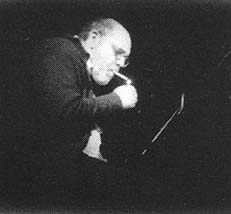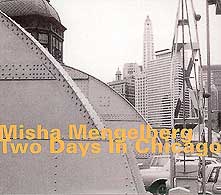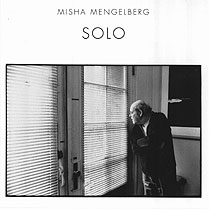
A FIRESIDE
CHAT WITH MISHA MENGELBERG
I do my interviews a specific way. It may not be the best of choices.
And my approach is not everyone's cup of tea. But it is my way and I would
rather do it my own original way than copy someone else's approach. I
require time. I need it to get to know the artists beyond what I have
heard on record and what I have read in the press. Not all artists have
that kind of time and even amongst those that do, not many trust me enough
to give that kind of time. Misha Mengelberg is a fine player. But busy
is not a word that does the pianist justice. His schedule is down right
frightening. So I was honored that he would take time in his busy day
to answer some of my inquires. But until his hectic schedule calms down
a bit, this will have to do for the now. I will try and do better next
time, as I bring this to you, as always, unedited and in his own words.
FRED JUNG: What prompted you to become a musician?
MISHA MENGELBERG: Somewhere in the mid-'50s, I felt that music was about
the only category that I seem to have a little talent for.
FJ: Were you drawn to the piano immediately?
MISHA MENGELBERG: Yes, I played the violin for a short time. The fact
that the piano can act as an orchestral placebo attracted my interest.
FJ: What were you listening to then?
MISHA MENGELBERG: Strawinsky, the second Viennese school, Ellington, Monk.
FJ: Why did you choose to play avant-garde and not like Bill Evans or
Dave Brubeck?
MISHA MENGELBERG: There was a short period of Brubeck-fascination.
FJ: What was the improvised music scene like in Europe at the time?
MISHA MENGELBERG: There was no scene. We had to make one - there was no
work at all - we tried to create work.
FJ: Why did Europe accept so many American artists?
MISHA MENGELBERG: Europe had a tradition for being receptive to other
cultures.
FJ: You played with Eric Dolphy on his Last Date recording, what was your
initial impression of Dolphy and has that changed through the years?
MISHA MENGELBERG: My initial impression was listening to his records:
a very strong and vital player - that is what I still think.
FJ: Which of these musicians affected the music more for you, John Coltrane,
Albert Ayler, or Ornette Coleman?
MISHA MENGELBERG: Albert Ayler was as I see it one of the last big American
improvisers. Among the living, I have much respect for the work of Anthony
Braxton and George Lewis. Their efforts make me always curious.
FJ: As a composer, what are looking for in a composition?
MISHA MENGELBERG: A more or less nice composition should induce a continuous
lust for more of it.
FJ: Why did you take part in starting the ICP Orchestra?
MISHA MENGELBERG: For fun - that involvement helped me to develop interest
in the musical contributions of my co-members.
Fred Jung is Jazz Weekly's Editor-In-Chief and master of his domain. Comments?
Email
Fred.


